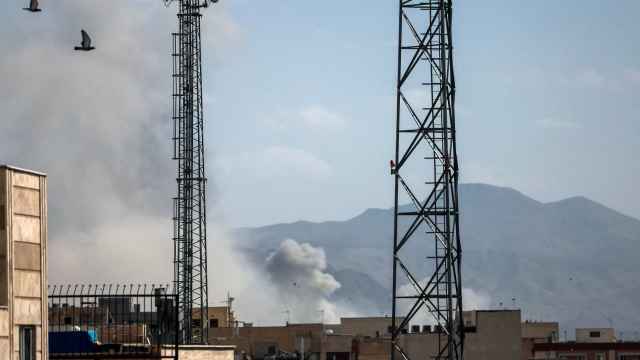Pluralism on state-controlled television has increased by exactly one-third in recent weeks. But even this small change has led to some very unpleasant consequences for Muscovites. Until just recently, ordinary television viewers could be certain that there were two perfect people in Russia: President Dmitry Medvedev and Prime Minister Vladimir Putin. Now there are three. Mayor Sergei Sobyanin has become as permanent a fixture on national news as Medvedev and Putin. Sobyanin stares out from the screen with a fatherly and menacing gaze, smiting evil by ordering the removal of street vendors’ stalls that block the view of the monument to the 1905 Revolution and dismissing the prefects who had permitted such an outrage — and causing low-ranking Moscow bureaucrats to quiver in their boots.
Then, last Wednesday, on the eve of National Unity Day, the Press Distributors Association reported that the authorities had initiated the mass closure of newsstands. The campaign even continued over the weekend. The kiosks’ electricity has been turned off and the vendors have been given a brief opportunity to haul away their wares before cranes arrive and move the kiosks to places unknown. At the current rate, about 1,000 kiosks will have soon been removed, causing circulation to fall, the Press Distributors Association said.
This does not mean that a campaign against press freedom has begun. As Press Distributors Association board chairman Alexander Oskin explained: “Every big city boss in Russia enters office by battling the ubiquitous kiosks. And district officials charged with implementing that policy always look for easy prey. The print media business doesn’t make enough money to buy off the officials, and that is why they — and not the more profitable shwarma stalls — are the first to go.”
Last Wednesday evening, I encountered an unusual situation on the street near my home. The bread kiosks and newsstands were shuttered and dark, and a small store selling flowers and draft beer was operating by candlelight. A saleswoman there told me, “A local official stopped by after lunch and told us that our electricity would be cut over the holiday weekend and that on Monday they would check to see whether we are legally hooked up to the grid.” Naively I asked, “Wouldn’t it make more sense to check first and then turn off the electricity for violators?”
The saleswoman replied, “After four days of working without electricity, the store owner will be ripe for giving a hefty bribe.”
Even as those words were spoken, a man calling himself an electrician appeared at the store and offered to “resolve the problem.” By the next day, the store was once again selling flowers and beer to the hum of electric lights.
I visited the mayor’s web site in search of an explanation for what was happening, but the most recent posting was dated only Nov. 2.
Nobody needs this form of increased pluralism on television. After all, when the president and prime minister speak, their words are directed at the entire country. As a result, nobody is in any hurry to carry out their orders, and their words do not cause much harm. But when Sobyanin speaks, his remarks concern a specific city, and even a hint that this or that situation needs to be rectified can cause his subordinates to fulfill — and exceed — his demands. Of course, the only change this ultimately brings about is the need to pay more in bribes. It would be better for everyone if the new mayor issued his orders in written form or through the Internet because his televised remarks are wreaking havoc in the capital.
Alexei Pankin is editor of WAN-IFRA-GIPP Magazine for publishing business professionals.
A Message from The Moscow Times:
Dear readers,
We are facing unprecedented challenges. Russia's Prosecutor General's Office has designated The Moscow Times as an "undesirable" organization, criminalizing our work and putting our staff at risk of prosecution. This follows our earlier unjust labeling as a "foreign agent."
These actions are direct attempts to silence independent journalism in Russia. The authorities claim our work "discredits the decisions of the Russian leadership." We see things differently: we strive to provide accurate, unbiased reporting on Russia.
We, the journalists of The Moscow Times, refuse to be silenced. But to continue our work, we need your help.
Your support, no matter how small, makes a world of difference. If you can, please support us monthly starting from just $2. It's quick to set up, and every contribution makes a significant impact.
By supporting The Moscow Times, you're defending open, independent journalism in the face of repression. Thank you for standing with us.
Remind me later.





